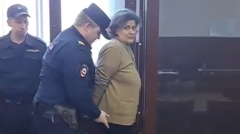Anna Alexandrova, a hairdresser from St Petersburg, has been sentenced to five years and two months in jail under a controversial law against spreading fake news about the military. After a dispute with a neighbor, she was accused of posting anti-war messages online, a charge she denies.
St. Petersburg Hairdresser Sentenced Amid War Dissent Crackdown

St. Petersburg Hairdresser Sentenced Amid War Dissent Crackdown
Anna Alexandrova faces over five years in jail for alleged anti-war social media posts, highlighting Russia's escalating repression of free speech.
A 47-year-old hairdresser from St Petersburg, Anna Alexandrova, has been sentenced to five years and two months in prison after being found guilty of disseminating false information about the Russian military. This legal action stems from eight alleged anti-war posts shared on Russian social media platform VKontakte. Alexandrova claims her conviction is rooted in a personal dispute over land with her neighbor, who reported her to authorities following a series of domestic conflicts.
The introduction of stringent laws against "discrediting the armed forces" followed shortly after Russia's full-scale invasion of Ukraine in February 2022, leading to the prosecution and imprisonment of numerous dissenters and critics of the Kremlin. Alexandrova’s case notably illustrates how these laws have been utilized to settle personal grievances. Her lawyer described the case as originally stemming from a local environmental concern regarding deforestation, only escalating to a criminal charge when fake news legislation came into play.
The situation mirrors the political repression seen in Russia in the past. With the courts actively silencing free speech, four journalists were recently sentenced to five and a half years each for supposedly working with an "extremist organization." These recent clampdowns on dissent resonate with chilling reminders of historical betrayals during the Soviet era, where citizens informed on each other in exchange for favor or protection.
Amidst the crackdown on critics, lawyers representing a Moscow city council member—the first to be sentenced under the same law—have challenged the law's constitutionality. They argue it's being misused to suppress legitimate dissent and punish voices advocating for anti-war sentiments. As the Russian government continues its course of censorship, cases like Alexandrova's raise concerns about the balance between national security and individual rights amidst ongoing conflict.




















